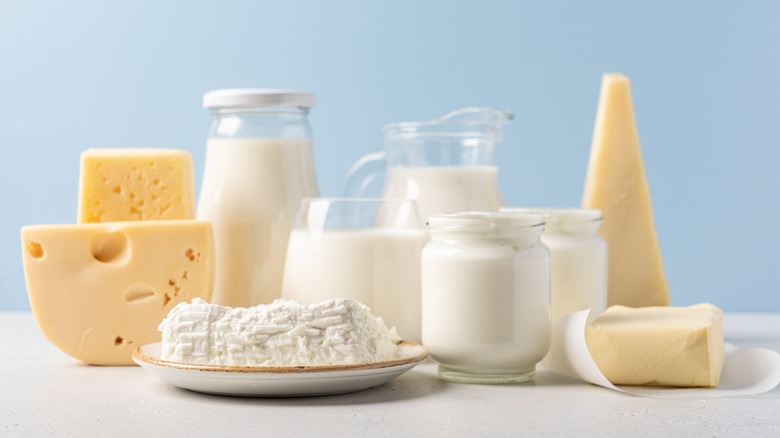Maybe Think Twice Before Drinking Milk If You Have This Medical Condition
Dairy is one of America's most beloved food groups. Packed with vitamin D and an excellent source of calcium, it's versatile enough to be made into a large array of tasty products. Dairy can be the cheesy, gooey goodness on your Friday night pizza or a chilly, refreshing fro-yo on a hot summer day. The options are endless, so what's not to love?
Unfortunately, though, dairy can come with a few downsides. Lactose intolerance is a genetic condition that ultimately inhibits the body's ability to break down lactose, dairy's main chemical component (per Johns Hopkins Medicine). However, new research suggests that there may be another group that should consider either avoiding or limiting dairy intake: individuals with hypothyroidism.
According to the National Institute of Health, hypothyroidism is a disease characterized by an underactive thyroid, the gland in your neck responsible for creating the hormones that control your body's energy output. These hormones are then utilized to regulate the functionality of the entire body. When the thyroid is underactive, however, hypothyroidism occurs, and it imposes a vast amount of consequences upon the human body, such as weight gain, fatigue, joint pain, and even fertility issues.
Dairy and hypothyroidism
Now, what's the connection between dairy and hypothyroidism? Well, medical professionals at NP Thyroid have determined that cow's milk and dairy products have been proven to exacerbate the production of inflammatory chemicals within the human body. These inflammatory chemicals can have negative effects on your brain and other parts of the body, including your thyroid if you are experiencing hypothyroidism. This correlation occurs because chronic inflammation reduces the number of thyroid receptors in the body, and may even affect the normal functioning of your thyroid hormones.
Additionally, a 2017 study found that dairy can even interfere with the body's absorption of a popular, commonly prescribed thyroid medication (via the Endocrine Society). The medication, levothyroxine, demonstrated a sharp decrease in absorption rate when consumed with cow's milk, which consequently hindered its functionality in the body as well. In consideration of this, medical doctors at Paloma Health recommend that individuals with hypothyroidism either limit or completely eliminate dairy products from their diet.
Dairy alternatives
If you still want to enjoy a nice, chilly ice cream cone or sprinkle some cheese on your tacos, well, fret not. There are plenty of healthy, tasty, and budget-friendly alternatives to dairy out there. You can easily find products like milk, cheese, ice cream, and yogurt made from non-dairy sources at just about any major retailer near you.
The most popular alternative out there these days would be nut milk. Nut milk is the liquid that is extracted after pressing nuts down. According to Healthline, nut milk has risen exponentially in popularity over the last few years, quickly becoming a favorable swap for those looking to cut back on dairy products. The most popular of the nut milks is almond milk, but products such as cashew milk, macadamia milk, and hazelnut milk make great alternatives as well. Generally, nut milks are packed with a wide array of health benefits, such as essential vitamins and minerals, and can prove beneficial to anyone's diet.



